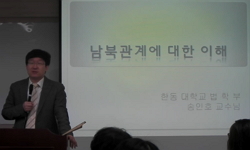Since its inauguration in 2008, the Lee Myung-bak government has stuck to its tough policy that North Korea must give up its nuclear programs before any large-scale aid and inter-Korean cooperation can resume. But such “principled and flexible” po...
http://chineseinput.net/에서 pinyin(병음)방식으로 중국어를 변환할 수 있습니다.
변환된 중국어를 복사하여 사용하시면 됩니다.
- 中文 을 입력하시려면 zhongwen을 입력하시고 space를누르시면됩니다.
- 北京 을 입력하시려면 beijing을 입력하시고 space를 누르시면 됩니다.

이명박 정부 대북정책 평가와 차기 정부 대북정책 방향 = Review of Lee Myung-bak Government`s North Korea Policy and Directions of Next Government`s North Korea Policy
한글로보기https://www.riss.kr/link?id=A99645502
- 저자
- 발행기관
- 학술지명
- 권호사항
-
발행연도
2012
-
작성언어
-
- 주제어
-
KDC
300
-
등재정보
KCI등재
-
자료형태
학술저널
-
수록면
153-183(31쪽)
- 제공처
-
0
상세조회 -
0
다운로드
부가정보
다국어 초록 (Multilingual Abstract)
Since its inauguration in 2008, the Lee Myung-bak government has stuck to its tough policy that North Korea must give up its nuclear programs before any large-scale aid and inter-Korean cooperation can resume. But such “principled and flexible” policy toward Pyongyang has undergone ups and downs, and the frayed relations between the two divided Koreas have plunged to the lowest level in decades. After the Lee Myung-bak administration came to power and the shooting of a South Korean tourist at the Mount Kumgang resort, tensions escalated further between the two Koreas, even more so with the Cheonan`s sinking and Yeonpyeong Island shelling. Among the South Koreans, the animosity toward the North grew deeper and that led to the belief that unification would come soon. The incumbent government`s North Korea Policy has been under severe attack by South Korean progressives and opposition parties. They have lashed out at the government`s hard-line policy, saying it has caused inter-Korean relations to plummet back to Cold War levels. Furthermore the South Korean government hasn`t found a way to thaw the chilly relations, and instead resorts to harshly criticizing the North Korea. Now the situations surrounding the Korean Peninsula are expected to change swiftly with the rise of a new leadership in South Korea.
동일학술지(권/호) 다른 논문
-
- 동국대학교 북한학연구소
- 차문석 ( Moon Seok Cha )
- 2012
- KCI등재
-
특집넌문 : 구술자료를 활용한 북한 도시연구 이론적 자원과 방법
- 동국대학교 북한학연구소
- 조정아 ( Jeong Ah Cho )
- 2012
- KCI등재
-
특집넌문 : 북한도시사연구에서 시각·영상자료의 분석적 활용
- 동국대학교 북한학연구소
- 박희진 ( Hee Jin Park )
- 2012
- KCI등재
-
- 동국대학교 북한학연구소
- 주창범 ( Chang Bum Ju )
- 2012
- KCI등재




 KCI
KCI KISS
KISS



